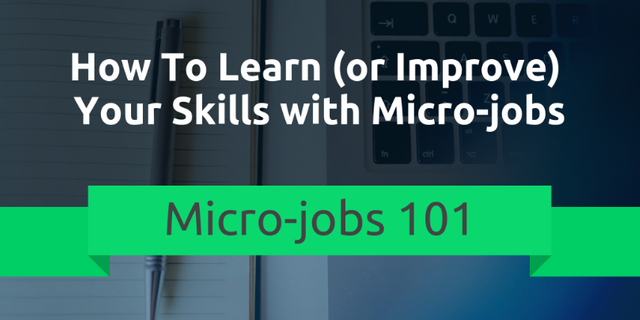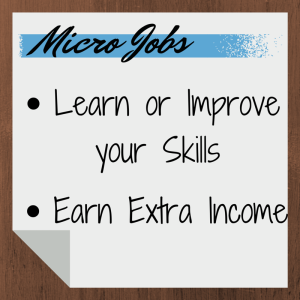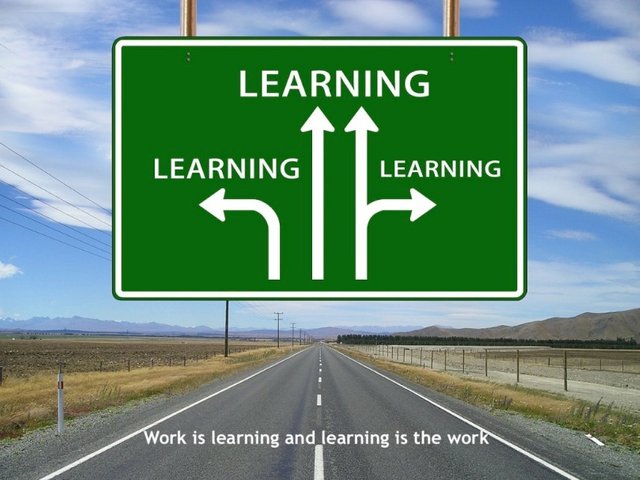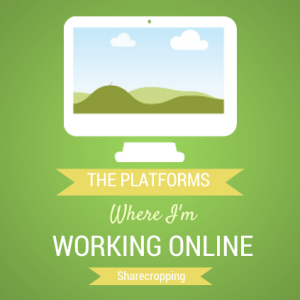How to Learn or Improve Skills with Micro Jobs
This post is a more in-depth look at the way I’ve been using Micro Jobs to both learn & improve my skills, and earn extra income..
What is a Micro Job?
In case you’re not too familiar with this term, here is a simple explanation:
Micro jobs are tasks that typically take 15 minutes or less to complete (but can also be up to a couple hours in length). These are mostly online jobs, so think of them as a task that is too small to outsource conventionally (setting up a job posting on Upwork, then hiring the best applicant).
Some examples might be: having a 500 word article written, getting a voice over for either your voicemail greeting or a short video, having header images created for your social media sites, etc.
Most of the time, these tasks are packaged more as a commodity. You’ll find a few types of sites available. On some sites, sellers list their services, and you choose one that is the best match based on price, ratings, and turnaround time. The second site you’ll likely encounter is one that you post your task on, and freelancers will submit their bids to you.
There are pros and cons of each, but for today, I’ll be sticking to the first type of site. This type of site will usually get your work finished quicker, without having to sift through dozens of bids, and in most cases, you don’t pay (or can be refunded) if you’re not satisfied with the work.
Micro Job Strategies
I’ve found there to be 2 main ways that micro jobs are used.
- as a buyer outsourcing or delegating small tasks
- as a seller to earn extra income
For this post, I will be focusing on a variation of strategy #2.
I've be updating you with specific details in a future post, but suffice it to say that I have been in the middle of a huge shift in my personal & professional life these last couple years. As my business was changing, I realized that I needed to learn new skills, and replace my offline income with online sources.
I started on this journey back in March 2014, and in this time have sifted through many ‘opportunities’ (which mostly ended up being dead ends, scams, etc.), and was able to eventually find some legitimate online jobs.
After much trial & error, I settled on these elements to make up my micro jobs strategy:
- I must be learning skills that serve a dual purpose.
- These skills must build on each other.
By serving a dual purpose, I mean that my primary reason for working on micro jobs platforms is to learn skills that I can apply in multiple areas of my life.
Writing or marketing, for instance, can both be applied in a variety of areas, while whistling or juggling, on the other hand, have limited applicability in life (for most people).
By having the skills build on each other, I mean that I prefer them to be related and in the same field, rather than scattered all over the place.
Earning extra income is another factor to consider, but it only plays a minor role. What the income does, is provide motivation and accountability.
A ‘Real World’ Example
For a real world (non-micro) example, I spent a few years working as the Editor in Chief for a community organization, and later was elected as the Executive Director for that same group, mainly to learn and improve my skills.
Some of the skills I learned include: design & layout, copy editing, proofreading, desktop publishing, print & email marketing, and payment processing. While those skills came in handy for my offline business, they also help in running an online business and blogging.
Why Micro Jobs for Learning Skills?
The reason I’m emphasizing Micro Jobs for this purpose, is that the work is in bite sized chunks, and doesn’t require an ongoing commitment. It is also easy to change directions, if need be.
It also has another added benefit. When you become a seller on a Micro Job platform, you will learn how to communicate effectively with your buyers, a skill that will be useful should you become a buyer when outsourcing and delegating tasks.
So that’s a summary of why I feel that working as a seller on a Micro Job platform is a very effective way to learn or improve your skills.
My Journey
Now I’m going to share which skills I want to learn and improve, which platforms I’m working on, and how all of this fits into my overall online business strategy.
First, let’s start with a list of the platforms I’m currently working on, and a few more that I’ve tested out. I’ll also mention which skills I’m learning or improving. Afterward, I’ll cover their importance in the long run..
Fiverr
I started on Fiverr in April of 2014, and within 4 months I had turned it into a low 4-figure monthly income.
When I initially started, it was entirely for the income, but I quickly saw that this was a big opportunity to learn something new.
I started out by learning customer service, and then added “gigs” in areas where I felt I needed some work. So far, I’ve learned how to sell a service, communicate with buyers, and create & streamline systems for order delivery, communications, etc.
I’ve even gone so far as to write a book, Double Your Fiverr Income, detailing my methods for success.
Fiverr Clones
I started expanding onto a few new ‘Fiverr like’ platforms once I become successful on Fiverr itself. I basically just cloned my Fiverr account onto many of these sites.
They don’t get nearly as much traffic as Fiverr (even combined), but I didn’t think it could hurt to cast a wider net. I still get some sales from them, usually whenever the site owners do a big marketing push, but they almost aren’t worth the time. This next site, however, has been a great addition..
People Per Hour
I actually came across People Per Hour by accident. This platform didn’t show up in my searches for ‘Fiverr clones’, but I found it through the online learning platform Udemy when I was looking for courses about Fiverr.
What I like about it is that is combines the ‘bid on jobs’ type of freelancing site with the ‘one and done’ gigs from Fiverr (which are called ‘hourlies’). The site feels a bit more professional, and jobs go for a much higher price than you can get on Fiverr, although it is a smaller site.
What I like most about these platforms, is that there is a definite beginning and end to each order. From start to finish, it usually only takes between 2–10 minutes to complete an order.
There’s no hunting for (and then bidding on) jobs, haggling on price, etc. You simply put your service out there, and fill orders as they come it.
iWriter
Once I took on the mindset of using these platforms to learn or improve my skills, I realized that my writing could use improving.
Although I’ve had good results from the web & email copy I’ve written, it would take me a long time to complete. What better way to improve, than by writing on various topics, with money and positive ratings at stake.
I got started on iWriter, which has this probationary period where you need to write 30 articles and maintain good ratings before you can actually start making decent money. This put positive pressure on me to write faster, otherwise I would practically be working for free.
Once you make it past the first 30 articles, you can actually start making decent money, but at that point I began to put that effort into blogging instead. (This was a case where I was mainly looking to improve skills, and the money was a distant second.)
Blogging is also a Platform
While we’re still talking about writing, I should mention blogging, both here on Steemit and on my own site, as another 'platform' I’m working on. I’m looking to further improve my writing, and also learn WordPress, SEO, and everything else that goes along with running a blog.
It also helps me to gather my thoughts for future books, and lets me connect with other like-minded people online.
How They Tie Together
As I mentioned earlier, these skills need to build on one other. Still being somewhat new to the world of online business, there is so much to learn. These platforms provide me with motivation, income, and the skills I’ll need to continue to grow as a Digital Nomad.
In the short term, I’m finishing up my second book, and in the usual fashion, writing this book is another avenue to learn some new skills. My eBook can also be turned into audio book, and maybe even video courses on Udemy.
So there again, building on what I’ve already learned. I’m sure you can see the pattern. Everything I do has a long term focus, and I highly recommend you take this approach too. To the outside world, you’ll eventually look like an “overnight success”, but you will know the truth.
An overnight success is really built one step at a time, one day at a time.
Thanks for stopping by, all the best!
Patrick









I think, you could have hired a designer on fiverr, to spice up this post on Steemit.
I enjoyed the read a lot,
but the graphics look like copy- paste.
I see this blog is aiming at high quality and this detail would - in my opnion - make the difference.
Good contribution - very inspiring.
Thanks for the feedback! (I do spend much more time on the content than the images)
I used Canva to create most of these images, and a couple are unedited royalty free images from Pixabay.
Some people earn full time income at those freelancing websites, but I dont think the majority do, they might just improve their skills and move to work for a company instead. They might even find jobs there, as they can get referred to experts that would hire them.
Yeah, most people I've talked to only do this part time. After my first 10k, I scaled quite a bit so I wouldn't have to commit more than a couple hours each week to the work.
What excites me, though, is that you can get paid to learn & improve with real time market feedback (and a minimal time investment) and you can then take that experience on to bigger & better things.